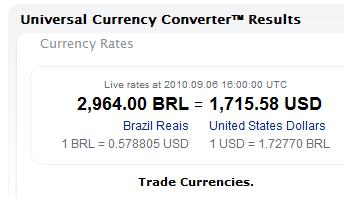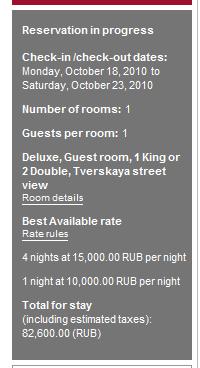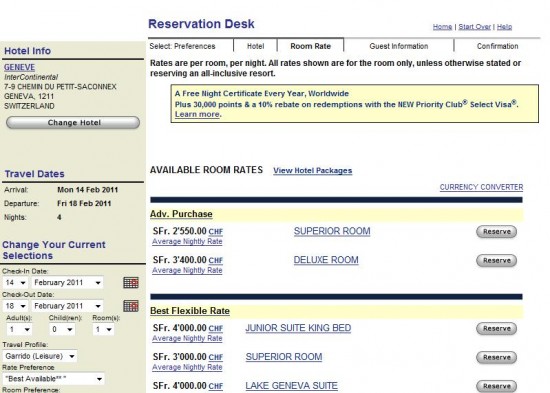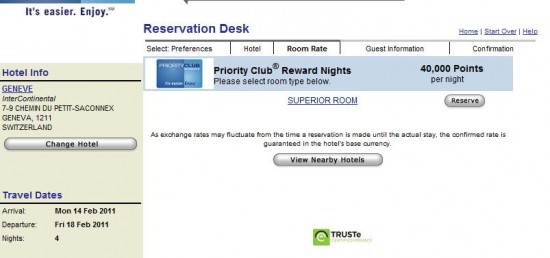The average point value for hotel loyalty points is shown on credit card sites like NerdWallet.com and PlasticIQ.com. Lucky estimated the value of a point for several airline and hotel programs in his August 2010 InsideFlyer – The Value of a Mile or Point.
Lucky states in his article that it is useful to have a relative value of points and miles when trading or exchanging currencies between programs or choosing whether to earn miles or points for hotel stays.
The last time I seriously delved into the question of the value of a hotel point was last January. I want to develop ideas from that post more fully here.
Three Rules Governing the Value of a Point or Mile
Over the past decade I have developed three rules as Loyalty Traveler I believe govern the value of points for the hotel loyalty program member.
Loyalty Traveler Rule #1: Points have no value until redeemed.
This applies to airline – hotel – credit card – other loyalty programs.
Every hotel loyalty program has the ability to terminate its loyalty program. Your points can be gone tomorrow.
Look at Mexicana Airlines. I may have just lost 100,000 miles. I valued those miles at $10,000 seven years ago when I could have flown Cathay Pacific First Class across the Indian Ocean from Hong Kong to Johannesburg on miles. But I never booked that trip.
I’ll call your ½ cent and raise
So what does it really mean to say a Hilton HHonors point has a value of one-half (0.5) cent or seven-tenths (0.7) of a cent?
I taught junior high math for a couple of years. I know that working in decimals gets confusing for many people so I try to work in whole numbers when talking about the value of points.
Saying a Hilton HHonors point is worth ½ cent is the same as saying 1,000 points are worth $5.00. Since redeeming points usually involves multiples of 1,000 points I use whole dollar values per 1,000 points in Loyalty Traveler data to get away from decimal abstractions and confusion.
Now back to the question.
What does it really mean to say Hilton HHonors points have the value of $5 or $7 per 1,000 points?
There is a discrepancy between HHonors point values of 0.7 cents/point by Lucky and 0.5 cents/point by NerdWallet. A cardmember who earns 100,000 points has $700 in points by Lucky’s standard or $500 in points by Nerdwallet’s valuation. PlasticIQ drops the value down to $4.30 per 1,000 points or $430 for that HHonors member sitting on 100K in hotel currency.
Â
Calculating Hotel Point Value
Â
         Value of 1,000 points = Room Rate / Points needed to buy room
Hotel point value is set by redeeming points. Every individual loyalty program member will have his or her own estimate of the average point value based on actual points use and personal history of point redemptions. Lucky states this idea in his article too.
Hilton Amsterdam
Let’s say I want to go to Hilton Amsterdam on November 5-7. I can pay the going rate of 199 EUR per night or use 50,000 points per night. Â
Best Available Rate is 199 EUR per night. After tax the rate is €417.90 = US$532 for two nights.
Hilton Amsterdam is a category 7 hotel for 50,000 points per reward night.
My effective points value is $5.32 per 1,000 points when I save $532 by spending 100,000 HHonors points for the hotel stay. (Ignore the points that would have been earned for a paid stay to keep math simpler.)
But should I even use the BAR value of $532 to calculate the value of my points?
I could book the Hilton Amsterdam using an advance purchase rate for 169€ per night. This is a more restrictive rate than using points since there is no ability to cancel or change the reservation, whereas a reservation booked with points can be canceled and points returned to the account.
354.90 EUR = US$457.65 = 100,000 points.
My points value with this Hilton Amsterdam redemption is $4.58 per 1,000 points. This falls well below the $7/1,000 points value from Lucky and even below the $5.00 per 1,000 points used by NerdWallet.com.
The real points value in this example is somewhere between $4.58 and $5.32 per 1,000 points depending on which rate I use, prepaid or refundable rate, Â for the cash saved on the hotel stay.
Loyalty Traveler Rule #2: The value of points is not a set value, but will objectively fall into a range of point value for the specific loyalty program.
Establishing the point value range for the different hotel loyalty programs is a challenge. This requires extensive data.
Lucky states Starpoints have a value of $25/1,000 points. NerdWallet states $23/1,000 points and Plastic IQ uses $21.50/1,000 points. These are considered average redemption values.
For example, some Starwood Hotels may only offer $10 per 1,000 points value when using points for a reward night. Other Starwood Hotels may offer $60 per 1,000 points value. The actual value of Starpoints may fall somewhere in this range from low to high reward values.
HHonors has a different range of point values for its program. You are highly unlikely to find a Hilton HHonors reward value in the $60/1,000 points range, whereas you can likely find a Starwood Hotel in that range. HHonors would require finding a reward for a hotel rate in the order of $2,175 per night with a category 7 hotel on an AXON7 four-night award at 145,000 points to have $60/1,000 points value. The upper limit of the value range for HHonors points will likely be somewhat below $60/1,000 points. But if you found any HHonors hotel reward with $60/1,000 points value, then the value of HHonors points objectively would have a range going up to $60/1,000 points.
Calculating the range is a matter of taking numerous hotel samples and analyzing the room rate divided by the cost in points for a reward night using points.
Value of 1,000 points = Room Rate / Points needed to buy room
Each hotel program will have a point value range specific to its hotels and loyalty program reward cost.
There are 1,000 Starwood Hotels. Rates fluctuate daily while the cost of a reward night is constant – as long as the hotel reward category does not change. Hotel categories shift over time moving the points cost up or down.
Special offers like Cash & Points, HHonors Pointstretchers, Marriott Rewards PointSavers and Priority Club PointBreaks also reduce the cost for reward nights during limited time discount offers.
Hilton HHonors – Show me the Money Value
What is the value of a HHonors point?
Lucky uses $7/1,000 points, NerdWallet.com $5/1,000 and Plastic IQ $4.30/1,000 points. While the average value of HHonors points may be in the $4 to $7 range for 1,000 HHonors points, loyalty travelers have the potential to get over $22/1,000 points.
Conrad Maldives
(HHonors category 7 hotel – 50,000 points per night)
Nov 5-9, 2010 = $3,276 after tax or 200,000 points
Â
HHonors point value is $16.38/1,000 points (1.6 cents/point) for this redemption.Â
HHonors elite members have access to VIP rewards. HHonors Silver elite membership requires just four stays in a calendar year. There is a 15% discount for HHonors VIP 4-night rewards reducing the 4-night rate for the Conrad Maldives to 170,000 points.
The HHonors VIP 4-night reward raises the point value to $19.27/1,000 points.
HHonors Silver elite is complimentary with any HHonors American Express card. As an HHonors American Express cardmember the hotel reward rate drops even more to only 145,000 points for an AXON7 award.
The AXON7 award raises the point value for this Conrad Maldives four-night stay to $22.59/1,000 points.
Conclusion: The average value of a HHonors point may be just $4 or $7 per 1,000 points. As a loyalty traveler you should not settle for average. There is potential to get over $20 per 1,000 points with HHonors. The range of HHonors point value has to go up to at least $22.59/1,000 points since I have found that potential value in a bookable HHonors reward.
And this leads us to rule #3.
Rule #3: You personally decide the value of your points when you redeem points. Â
Do not settle for average value. You are the points redemption DECIDER.
The third rule of hotel loyalty program point value is you have the choice at what minimum value you are willing to redeem your earned points.
The objective of the loyalty traveler is to redeem in the upper end of point value range for your hotel (or airline) loyalty program.
Nerdwallet.com gives Marriott Rewards points the value of 1.0 cent/point or $10.00 per 1,000 points. Lucky states Marriott Rewards points are 0.8 cents/point or $8.00 per 1,000 points. PlasticIQ is in the middle with $8.80/1,000 points value.
So are 200,000 Marriott Rewards points worth $1,600 or $2,000?
Marriott Monterey
November 3, 2010
$279/night or $308.06 after tax. The Marriott Monterey is a category 6 hotel for 30,000 points per night. The value of points is $10.27/1,000 points.
But change the stay to November 19 and the AAA rate drops to $170/night or $188.16 after tax.
Marriott Monterey points value = $188.16/30,000 = $6.27/1,000 points.
If points are used at the $188 rate, then 200,000 points are worth just $1,254, far less than Nerdwallet’s estimated point value ($2,000) or Lucky’s estimate of 200,000 Marriott reward points ($1,600).
So which value, $10/1,000 or $6/1,000 is the more accurate point value for Marriott Rewards points?
Is the actual value somewhere between $6.27 and $10.27 per 1,000 points?
How many hotels, rates and dates need to be surveyed to get the full range of point values and an accurate and precise estimate of the average point value for any specific hotel loyalty program?
Loyalty Traveler has not determined the upper value for hotel points. I just know that it is much higher than the point values used by Lucky, NerdWallet and Plastic IQ.
Â
Conclusion to the Value of a Hotel Point – The main takeaway idea from this post is your points need to be redeemed selectively to maximize value.
Loyalty travelers do not want to settle for average. All your redemptions should be in the top 20% to 30% of high value redemptions. If there is a range of $2 to $10 for 1,000 points giving an average of $6 per 1,000 points, then be the member who redeems only for $8 to $10 value and get better than average value for your points.
Loyalty travelers can get better than average value from hotel points.
There are 35,000 or so hotels in the top 10 hotel loyalty programs. Establishing a point value range requires much more data analysis than I have the ability to access. I do not know what the upper range of hotel point value is for different programs.
I do have an idea of where hotel rates are high and low and the hotel reward categories for hotels in the major hotel loyalty programs.
I was able to quickly find a number of high value redemption opportunities with just a few searches in each program. Each of the examples below had reward availability for the nights searched.
A loyalty traveler can get a much higher value for hotel points than the set values used by Lucky, NerdWallet and Plastic IQ.
Moscow Marriott Grand Hotel (Marriott Rewards category 5 = 25,000 points/night)
- October 18-23, 2010 (5-night stay)
- $2,698 after tax
- 100,000 points reward (5th night free)
Â
Marriott Rewards Point Value = $26.98/1,000 points (Lucky $8; PlasticIQ $8.80; Nerdwallet $10)
InterContinental Geneva (Priority Club = 40,000 points/night)
- Monday, Feb 14, 2011 – Friday, Feb 18, 2011 (4-night stay)
- US$10,078 after tax (advance purchase prepaid rate)
- $10,078/160,000 points =
Priority Club Points Value = $62.98/1,000 points (Lucky $6; Nerdwallet $6)
Hyatt Regency Pittsburgh International Airport (Gold Passport category 2 = 8,000 points/night)
- Monday, October 18, 2010 – Tuesday, October 19, 2010
- $227.09 after tax (BAR)
- $227.09/8,000 points =
Hyatt Gold Passport points value = $28.38/1,000 points (Lucky $15; Nerdwallet $15)Â
Â
Grand Hyatt Sao Paulo (Gold Passport category 2 = 8,000 points/night)
- Monday, October 18, 2010 – Friday, October 22, 2010
- 2,964 BRL after tax (BAR)
- US$1,715.58/32,000 points =
Hyatt Gold Passport points value = $53.59/1,000 points (Lucky $15; Nerdwallet $15)

Â
Starwood Le Parker Meridien New York (SPG category 5 = 12,000 points/night)
- Sunday, October 17, 2010 – Friday, October 22, 2010 (5-night stay)
- $553.15/night or $2,765.75 after tax for five nights
- $2,765.75/48,000 points (5th night free reward) =
Starwood Preferred Guest points value = $57.60/1,000 points (Lucky $25; PlasticIQ $21.50; Nerdwallet $23)
I found all these examples in random searches on random dates in about 45 minutes. There must be hundreds of hotels with similar reward night value.Â
Having an idea of the value of a point is useful information. Lucky did a good job at pointing out relative value of points and miles in his article. These values are a benchmark you can use for trades, exchanges, and promotion analysis. Just keep in mind that points and miles have no set value.
Remember the three rules governing the value of points and miles:
- Points and miles have no value until redeemed.
- The actual value of points and miles is a range and not a set value.
- You decide the value of your points with your redemptions.
Loyalty travelers can get better than average value from hotel points.





13 Comments
Comments are closed.